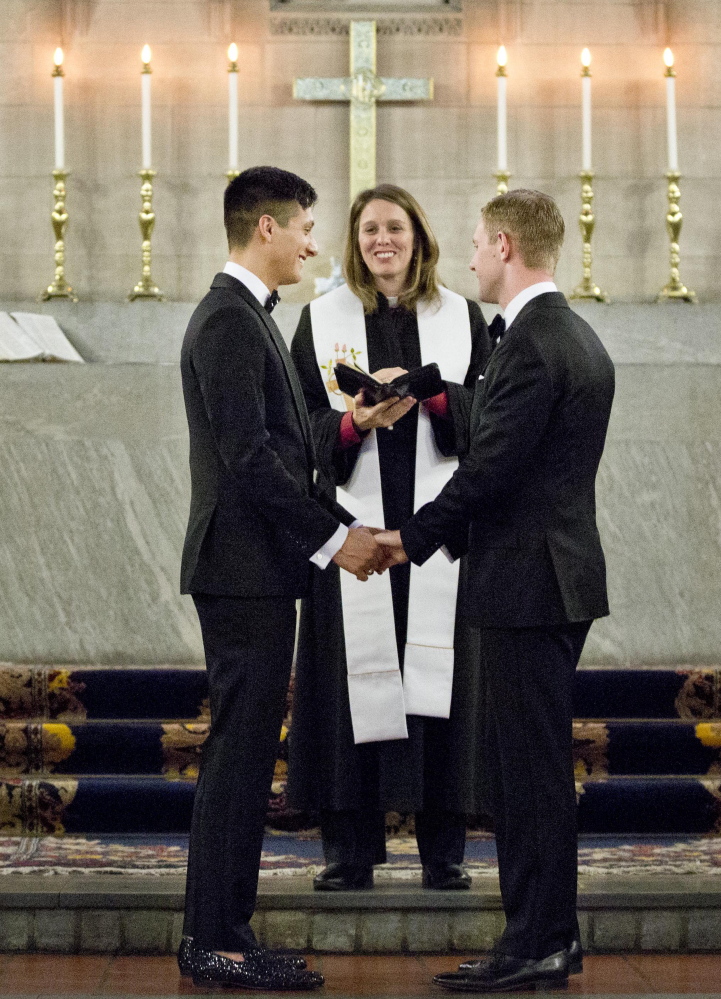NASHVILLE, Tenn. — Overall acceptance of gays and lesbians in U.S. religious congregations rose significantly between 2006 and 2012, but it declined in Catholic congregations, according to new data released Thursday.
Duke University’s National Congregations Study is derived from interviews with representatives – usually clergy – of 1,331 U.S. churches, mosques, temples, synagogues and other houses of worship.
Overall, the study found acceptance of gay and lesbian members in American congregations increased from 37 percent to 48 percent over the six-year period. Acceptance of gays and lesbians as volunteer leaders increased from 18 percent to 26 percent.
Growth was especially strong among black Protestant churches, white liberal Protestant churches and non-Christian congregations.
Carl Greene has lived through those changes as the openly gay leader of St. Mark’s Church in Chattanooga, Tennessee. St. Mark’s is part of the United Methodist Church, whose official position is that homosexuality is incompatible with Christian teaching.
Because he is gay, Greene is not allowed to be ordained, although he is a certified lay minister and leads his church with the blessing of local Methodist authorities.
When he took over the church in 2012, it had declined to about 20 members and was on the verge of closing. Today, it has about 150 members, both gay and straight. Greene said many people come to the church because of that diversity.
“I always hear, ‘We want our children to see the way the kingdom of God should look like,’ ” he said.
The study also found that acceptance of gay and lesbian members in white conservative Protestant churches increased from 16 percent to 24 percent during the period covered by the survey. Their acceptance of gay and lesbian volunteers was unchanged at 4 percent, however.
Russell Moore is president of the Southern Baptist Convention’s public policy arm, the Ethics and Religious Liberty Commission. While Southern Baptist Churches are independent, they subscribe to a statement of faith that says homosexuality is immoral. Because of this, Moore said, gays and lesbians who are not celibate should be welcome to worship in Southern Baptist churches but not admitted as members.
If a pastor came to him for advice on the matter, Moore said he would counsel, “Be loving and kind, but also be truthful.”
Perhaps surprisingly, given the support for gays and lesbians among Catholics in general, representatives of the Catholic churches surveyed expressed less acceptance of gay and lesbian members in 2012 than in 2006. Interview subjects were asked specifically whether openly gay or lesbian couples in committed relationships would be permitted to be full-fledged members of the congregation.
In 2006, 74 percent of those surveyed said yes. That number decreased to 53 percent in 2012. While the decrease is large, the rate of acceptance, 48 percent, still remains higher than that for all congregations surveyed.
Asked whether the same couples would be permitted to hold any volunteer leadership position that was open to other members, 39 percent of Catholic respondents said yes in 2006 but only 26 percent said the same in 2012. That is the same as the number for all congregations surveyed.
Several Catholic scholars said they were surprised by the findings.
Thomas Reece, a senior analyst with the National Catholic Reporter, thought it might reflect the fact that younger Catholic clergy tend to be more conservative than their older counterparts. Mary Ellen Konieczny, an assistant professor of sociology at the University of Notre Dame, suggested the change might reflect a growing emphasis by the bishops on issues of homosexuality over that period.
Both agreed that those attitudes were not indicative of what people sitting in the pews think.
Konieczny and others said they thought the answers might be significantly different if the same questions were asked today.
The survey was taken “before Francis got into the papacy, and I believe he would have made a difference,” said William D’Antonio, a senior fellow at Catholic University of America’s Institute for Policy Research and Catholic Studies.
Copy the Story LinkSend questions/comments to the editors.



Success. Please wait for the page to reload. If the page does not reload within 5 seconds, please refresh the page.
Enter your email and password to access comments.
Hi, to comment on stories you must . This profile is in addition to your subscription and website login.
Already have a commenting profile? .
Invalid username/password.
Please check your email to confirm and complete your registration.
Only subscribers are eligible to post comments. Please subscribe or login first for digital access. Here’s why.
Use the form below to reset your password. When you've submitted your account email, we will send an email with a reset code.